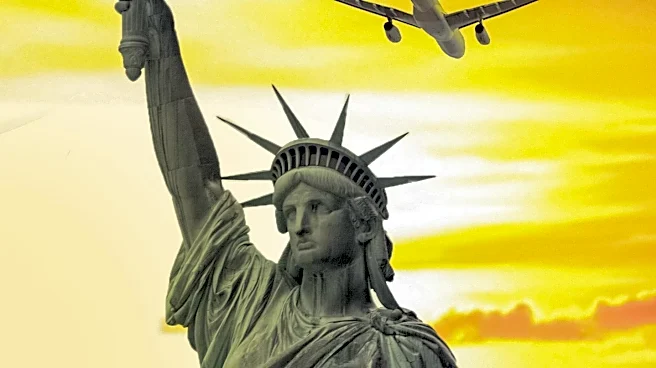What's Happening?
Americans are experiencing significant changes in their travel habits due to rising costs, as reported by NPR. The cost of travel has increased by 20% since 2019, driven by higher prices for gas, lodging, and recreation. Airfares have also risen, albeit more slowly, while food and beverage costs in restaurants have surged by over 30%. These increases are part of a broader trend of inflation affecting housing, groceries, and power, leaving less discretionary income for travel. As a result, many Americans are scaling back their travel plans. For instance, Ammy Woodbury from Santa Clara, California, who used to visit Disneyland three times a year, now plans to go only once annually due to increased costs. Similarly, Chris Neagle from Battle Creek, Michigan, has opted for a domestic trip to Vermont instead of an international vacation to Ireland.
Why It's Important?
The rising costs of travel have significant implications for the U.S. travel industry and consumer behavior. While luxury travel continues to thrive, middle- and lower-income travelers are feeling the financial strain, leading to a shift towards more economical travel options. This trend could impact domestic tourism, as more Americans choose road trips and nearby destinations over international travel. The shift in travel patterns may also affect local economies that rely on tourism, as fewer visitors could lead to reduced revenue for businesses in popular tourist destinations. Additionally, the increased cost of living, driven by inflation, is forcing consumers to prioritize essential expenses over leisure activities, potentially leading to a long-term change in spending habits.
What's Next?
As inflation continues to affect the cost of living, it is likely that Americans will continue to adjust their travel plans. The travel industry may need to adapt by offering more affordable options and promoting domestic tourism to attract budget-conscious travelers. Additionally, there may be increased interest in alternative travel experiences, such as camping and road trips, as consumers seek cost-effective ways to enjoy leisure time. The industry could also see a rise in demand for travel packages that offer value for money, as travelers look for ways to maximize their budgets.
Beyond the Headlines
The shift in travel habits due to rising costs may have broader cultural implications, as Americans explore more local and regional destinations. This could lead to a greater appreciation for domestic travel and a deeper understanding of the diverse landscapes and cultures within the United States. Additionally, the trend towards more sustainable travel options, such as road trips and camping, could contribute to a growing awareness of environmental issues and the importance of reducing one's carbon footprint.










